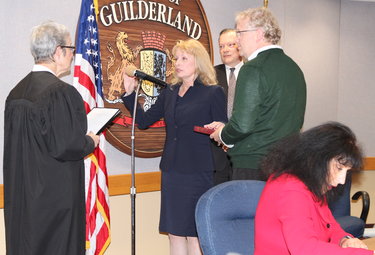Association of Towns proposes allowing remote meetings permanently
GUILDERLAND — State legislative proposals were discussed by the Guilderland Town Board at its Dec. 16 meeting as the board named Supervisor Peter Barber to be the town’s delegate for the annual meeting of the Association of Towns.
The meeting had been scheduled for Feb. 22 and 23 in New York City but may be held virtually, as it was in 2021, because of COVID-19.
Dennis Powers of Amherst in Erie County, who chairs the resolutions committee on which Barber serves, has submitted 10 legislative proposals for consideration.
Barber said the two “most debatable” proposals are one calling to amend the Open Meetings Law to permanently allow for remote meetings and another to amend prevailing-wage requirements.
Because of the pandemic, public boards were temporarily granted authority to hold meetings remotely as long as the public could view or listen to the meetings in real time and the meeting was transcribed.
The proposed resolution says that meeting remotely “fosters efficiency since issues such as inclement weather, sickness, and travel no longer present a barrier to obtaining a quorum.”
The resolution also says that most towns have already invested in the technology needed to conduct remote meets and that “many towns reported an increase in public participation and attendance when meetings were held remotely.”
“We take the position, it should only be applied during the pandemic,” Barber told the board during its remote Dec. 16 meeting.
He said that, with about 700 towns in the state association, there is no unanimous position. The association’s website says that 97 percent of the state’s 932 towns belong to the organization.
Barber also said it is difficult to do both an in-person and a Zoom meeting and not all towns have the ability to do so.
Guilderland, once COVID-19 restrictions are lifted, plans to go back to its former procedure of meeting in person and broadcasting the meetings.
Guilderland resident Robyn Gray called in to ask if call-in comments would still be allowed.
Right now, Barber responded, the state’s Open Meetings Law requires the person commenting to be in the room. That’s “the rub,” he said.
Barber also said that the large towns in the association often go one way while the small towns go another way; a town like Guilderland, with a population of about 35,000, is in between and those towns can go either way, he said.
Councilwoman Rosemary Centi said she backs the resolution to amend the prevailing wage requirement.
The state constitution requires public entities to pay laborers, workers, and mechanics performing public work prevailing wages unless the contracts are below $1,500.
The association’s resolution states, “The current method for calculating the ‘prevailing rate of wages’ for public works projects does not reflect actual local prevailing wages and results in local governments having to pay highly inflated wages, thus adding unnecessary costs to municipal projects.”
The resolution also notes that the exemption was set in 1971 and the Consumer Price Index has quadrupled since then and calls for the state legislature and governor to amend the state’s Labor Law to exempt building service contracts less than $50,000 and further to change the method to calculate prevailing wages “to more accurately reflect the prevailing wage within a particular community.”
“It makes sense to me,” said Centi.
“There are some problems with it,” responded Barber, stating it could be unfair to towns like Rensselaerville.
“The cost is about 50-percent more,” Barber said, adding that could be good as it is pro-union.
“It’s a balancing act,” he concluded.
Other resolutions proposed by Powers include preserving home rule; supporting highway, bridge, and transportation funding; preserving local authority while supporting expansion of cell and broadband service; and strengthening state and local government partnerships by restoring state revenue sharing.
Also: allowing municipal deposits at credit unions; creating a dedicated funding program for municipal water and sewer infrastructure; providing all towns with the authority to set speed limits on local roads; and reforming inequities in the real property tax-cap formula.
Other business
In other business, the board:
— Approved re-levying past due 2020-21 water bills on 2022 property bills. There were 1,190 delinquent accounts totally $177,343.85 to be re-levied;
— Made two permanent appointments: Daniel Ciccarelli as a water department laborer and Stephen Lord as a medic in the emergency medical services department;
— Extended the moratorium of digital programmable signs to March 18, 2022. “The signs law is the most litigated part of land use,” said Barber; and
— Scheduled the town board’s 2022 reorganizational meeting for Jan. 4 at 7 p.m.



